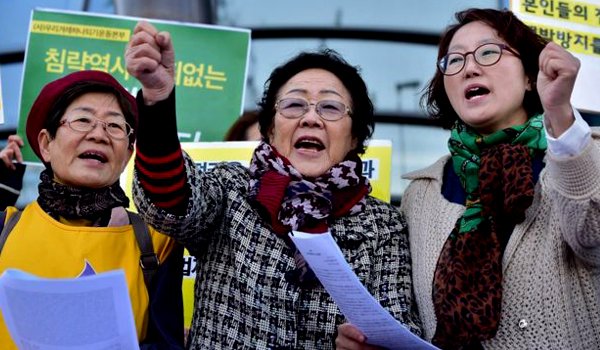Japanese Foreign Minister Fumio Kishida said his government will give 1 billion yen ($8.3 million) to a fund to help those who suffered.
South Korean Foreign Minister Yun Byung-se said that as long as Tokyo sticks to its side of the deal, Seoul will consider the issue "irreversibly" resolved.
In addition, the two governments "will refrain from criticizing and blaming each other in the international society, including the United Nations," Yun said at a joint news conference Monday.
Kishida said Japanese Prime Minister Shinzo Abe "expresses anew his most sincere apologies and remorse to all the women who underwent immeasurable and painful experiences and suffered incurable physical and psychological wounds as comfort women."
But an advocacy group for former comfort women said the deal announced Monday is "almost humiliating."
"Even though the Japanese government revealed they feel strongly of their responsibility, it is hard to find the fact that the Japanese military's 'comfort women' crime is systemically self-organized by Japanese government and the military in this agreement," said the Korean Council for the Women Drafted for Military Sexual Slavery by Japan's War & Women's Human Rights Museum.
It's estimated that up to 200,000 women were forced to be sex slaves for Japanese soldiers in World War II, mainly Korean. Other women came from China, Taiwan and Indonesia.
Responding to the agreement, China's foreign ministry spokesman Lu Kang said the forced recruitment of the "comfort women" was a grave crime against humanity.
"The Chinese side always maintains that the Japanese side should face up to and reflect upon its history of aggression and properly deal with the relevant issue with a sense of responsibility."
China, which was also occupied by Japan prior to and during the Second World War, has long been critical of its neighbor's role in the war and its apparent lack of remorse for war crimes following defeat in 1945.
Previous aid and criticism
Japan helped establish the Asian Women's Fund in 1995, which is supported by government funds and provides assistance to former comfort women.
But Tokyo had resisted direct compensation to the victims, prompting activists and former comfort women to say Japanese leaders were avoiding officially acknowledging what happened.
Today, only a few dozen of the women are still alive.
-CNN






